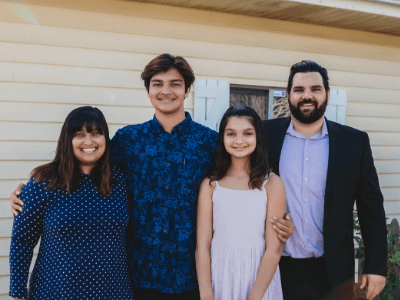
Toward the end of 2015, Tabitha Paccione developed a cough. Because she was a first grade teacher, and first-grade students tend to be little petri dishes, she – and her doctor – assumed it was just a cold. The cough, however, got worse and despite a clear chest X-ray, turned into bronchitis and pneumonia.
In the spring of the following year, Tabitha was still coughing, and still chalking it up to the common cold. She thought little of the pain she developed in her back, assuming it was caused by her lifting weights, part of an exercise regime that also included CrossFit and healthy eating. In the best shape of her life, Tabitha could not understand why she felt unwell and why she would get winded from both strenuous exercise or simply walking up a flight of stairs.
Three visits to her doctor would result in a variety of diagnoses: bronchitis, allergies, and even acid reflux. She was prescribed antibiotics, cough medicine, and steroids. Nothing made a difference.
Getting Answers: A “Series of Little Miracles”
One morning, Tabitha awoke to the sight of a large nodule sticking out of her neck. As someone very in tune with her body, she knew something was wrong. Her first concern was that it was somehow related to emerging issues she was having with her thyroid. She met with a head and neck surgeon who, prior to committing to surgically removing both the nodule and a portion of her thyroid, insisted on an MRI and CT scan. Tabitha, it turned out, had a 5 cm mass on her left lung.
From this lung cancer detection, things moved quickly through what she refers to as a “series of little miracles.” Despite a typically three-week waitlist, a thoracic oncologist saw Tabitha the very same day her scans were performed. He immediately did biomarker testing. Tabitha, a 35-year-old mother of two, had Stage 4 adenocarcinoma, 29 brain metastases, and the ALK+ mutation.
From Diagnosis to Treatment for Stage 4 Adenocarcinoma
Within days, she began what was to be three rounds of IV chemotherapy. Severe neuropathy forced the cessation of that protocol and she began oral medication two days later. That, along with two rounds of stereotactic brain radiation yielded outstanding results: Tabitha is currently in remission, having had the last three rounds of scans come back clear.
“I feel really lucky. Having lung cancer has completely changed my life: not because of the inconvenience or being sick – that I wouldn’t wish on anyone. It has been the best thing because I am so much more grateful, so much more appreciative of life. Before all this, I wasn’t on the right path. I was competitive, complained a lot, and was unhappy for no reason. Now I don’t sweat the small stuff and truly enjoy every moment. I focus on compassion and forgiveness.”
A woman of faith, Tabitha reflects back on her lung cancer journey thankful for not only the little miracles, but the time with her family and her swift remission; all of which she attributes to her faith in God.
She is grateful to have the opportunity to share her story about Stage 4 Adenocarcinoma. And she wants to let people know that they are not alone. With such rapid advances in lung cancer research, there is so much promise—more than ever before that people are living with lung cancer. Just ask Tabitha.

